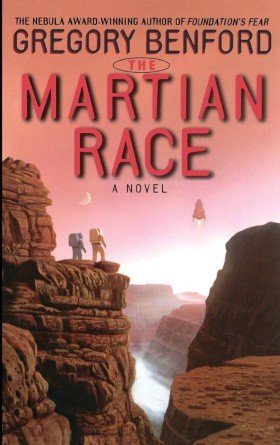You want antibiotic resistance? Swap with another bacterium and get the gene you need.
The vexing part was that this kind of solution had been available to them all along. Nobody had to die.
But Earthside was aboil with negotiations between the Consortium and Airbus. Lawyers angrily slapped writs on each other, over fuel and ships a hundred million miles away. Airbus argued that the Consortium team failed if it could not get home without Airbus help: they should at least split the $30 billion prize money.
This provoked a brief flurry within the governments who had to pay the bill. The Mars Board announced that the terms of the contest specified only that the first team returning successfully from Mars would be the winner. Anything else was between Airbus and the Consortium. Politicians carefully tiptoed away from the problem.
Intense public interest greased the negotiations. Airbus couldn’t refuse the team their only chance to get home with the whole world watching. And none of the negotiators could have stopped the crew from taking the ship anyway.
Finally they agreed. Overnight, four billion dollars changed hands. They even made a little meaningless ceremony of it; she saw it on her news squirt. Deep in the bowels of a Swiss bank, a dolly heavily loaded with gold bars was wheeled from one vault to another.
She did some bargaining herself.
“I want a done deal,” she told Axelrod. “Here’s how. I send samples back. Not live, preserved. Dead. No threat to Earth, so you have no problems with the crazies. After you get the prize, you don’t own the samples, either. They belong to science. This is too big for proprietary secrecy.”
She took a steadying breath. Part of her training did not like talking back to The Boss. Well, get used to it. Get used to years of it, probably.
“In return for sending the samples, I get the DNA analyses. Also a ton of biological lab gear, sent on the next ERV you’re launching. Literally a ton—a thousand metric kilograms. I’ll pick the equipment.”
She paused for the big leap. “And a biologist. I need somebody to work with here. Find a list of candidate astronaut biologists. I pick one. You send him—or her—on the next ERV.”
She smiled to take the edge from all this. It really disabled you, pitching to a camera with no feedback. “I get this—or you get nothing. No more information on what I find here. No videos of future vent descents. Zip, nada, zero.”
She allowed herself a raised eyebrow. “I expect my colleagues to send me the research papers based on my samples for review. First. Before leaking them to trivid or journals. That’s the way it’s done in science. Real science.”
She smiled to herself. The joke was on the pure-Earth fanatics. The samples were technically dead, but the way she was preserving them, the DNA wouldn’t be harmed. Fat chance those samples wouldn’t be sliced and diced every which way before a week was out. Every hotshot DNA lab on Earth was working up its protocols already, in anticipation. Eager hands would identify and slice out the specifically Martian genes, splice them into Earthly anaerobes, and have working pseudo-Martians within a month.
The march of science. Competition. She could count on it.
She couldn’t prove any of her speculations, of course. Not without knowing more about Martian DNA.
One evening in the hab, after they were all tired out with the sheer grunt labor of farming water from the pingos, she had seen it. What to look for, once her samples reached the labs of Earth.
The DNA code might just hold the answer. Earth’s code was mercifully redundant: a mistake in the coding was like a change in spelling that doesn’t always alter the meaning. There were alternate spellings for the same amino acid. And of course proteins themselves have regions where a substitution of a different amino acid doesn’t really matter. Room for error, with no consequences.
She had always thought that was a response to a rapidly evolving planet with lots of mutating agents: a Darwinian hotbox world. A rich world struck a balance between conservatism and experimentation, achieved over billions of years on a planet where evolution’s lathe was always spinning.
Earth’s climatic fluctuations changed the rules of survival, flipping from warm to cold and back again. It led some to postulate the Red Queen hypothesis: you have to keep running to stay in the same place, the entire biota evolving in fast lockstep to avoid being left behind. The pace was grueling, and a species lasted on average only a million years or so before running out of steam.
What would happen on Mars, where there may have been only one golden age of evolution, and a long twilight of one-way selective pressure? The young soil got ever colder, ever drier, the atmosphere ever thinner. Tough times…forever.
On Mars, would the DNA code be more conservative, simpler, and more precise?
Without sudden climatic shifts, the need for redundancy disappeared. Every error would be significant.
The price? Evolution would be slower. Even on Earth, most mutations were unfortunate, spelled gibberish, and killed the organism. Only a very few were useful.
On Mars, the chance of a successful mutation would be much smaller in the steadily worsening, harsh conditions.
But there had also been brief eras of warmth, when water flowed on the surface. Then what would happen? Evolution couldn’t work fast enough to take advantage of the new conditions.
So…what else? Could cooperation have become the winning rule, and not competition?
She looked around the tiny hab commons room at her teammates. Five tough-minded types with different skills, fitting together into an efficient whole. Four had survived near disasters and a grueling eighteen months in this freezing, near-vacuum rustbowl because of their efficiency. That’s what her subconscious had been trying to tell her.
Could it work on a planetwide scale?
Find a partner with the desired characteristic, instead of trying to evolve it yourself. A short period of wet and warm brought the mats out of the vents and into the lake beds. Light-sensitive organisms loosed from the mat—those “shrimp”?—could colonize the seas, making hay in the brief summer while the atmosphere lasted. Maybe they could even photosynthesize!
Life that found partners to help it maximize the wet-era opportunities would be successful. Glowing mats and photosynthetic microbes. Free-swimming forms and protective films. Peroxide eaters and watery membranes, all somehow trading their resources.
An entire ecology, now driven far underground, nonetheless finding a path through the great Darwinnowing…
But always meshed into the spreading network of organisms, great and small…evolution in concert. Organisms still died their pitiful deaths, genes got erased…
And the system could grow even more interlaced, she saw…deep in the guts of a slumbering world.
She worked in the slowly reviving greenhouse to soothe her soul and spark her imagination. Although Viktor insisted she keep her helmet on, she opened the faceplate to the soft air. And in time…
The Marsmat in the mist chamber had reached some kind of limit, and was not growing much anymore. When she had more time, she would start changing its environment and see what happened.
After the liftoff, she thought. Vast stretches of time beckoned from beyond that horizon.
Meanwhile, she planted another crop of vegetables. Marc was busy at the nuke every day, and she would have to tend the greenhouse alone after he left, anyway.
Marc had never really moved back into the hab. He and Raoul spent most of their time working at the Airbus site, driving back in late afternoon only to eat and sleep.
One day Raoul had come back alone. His only comment to Julia and Viktor was that he felt like the odd man out wherever he went on Mars these days.





















